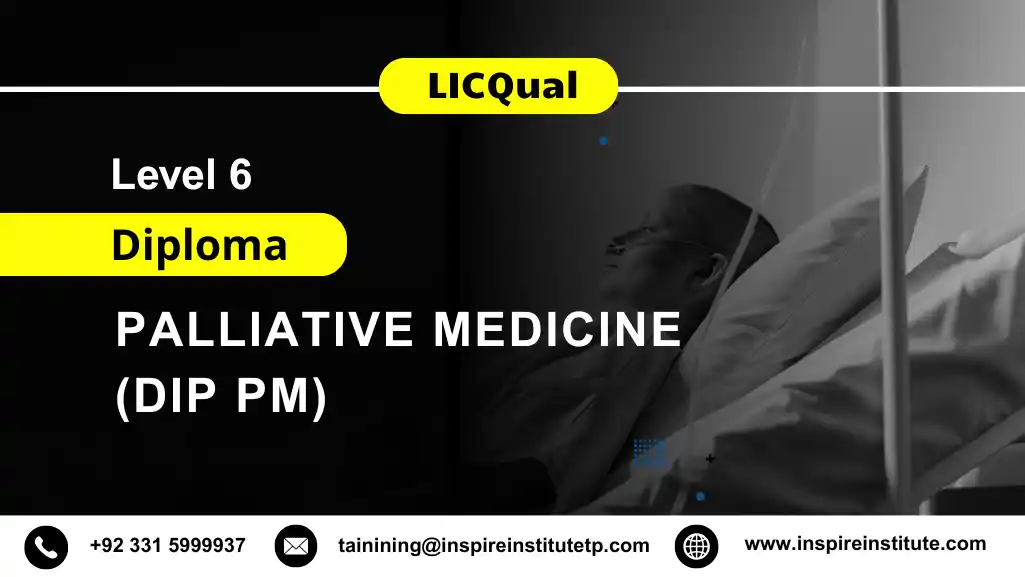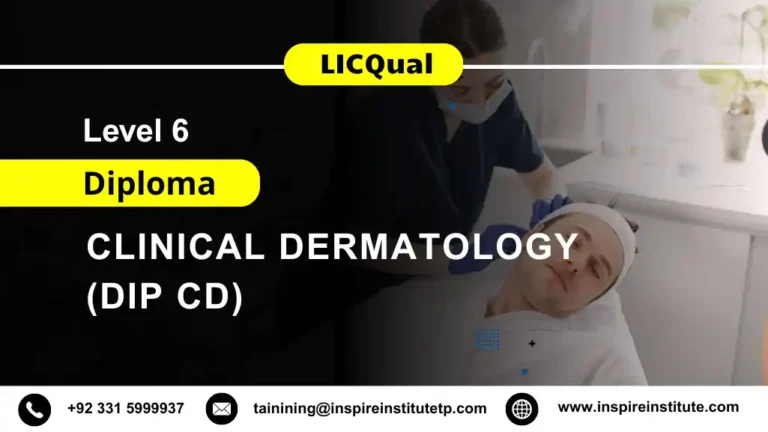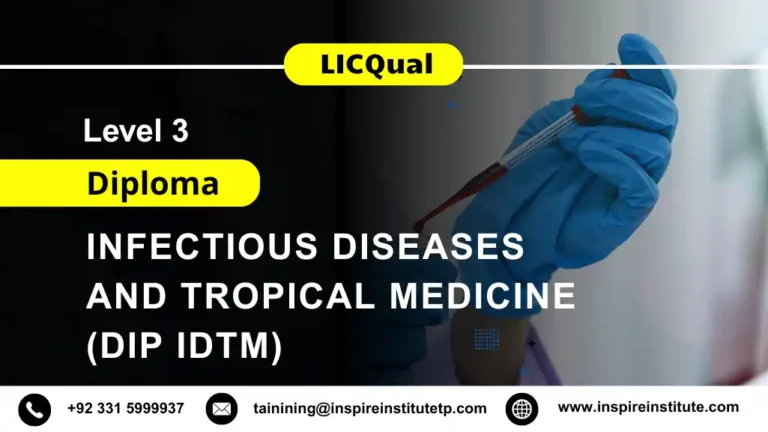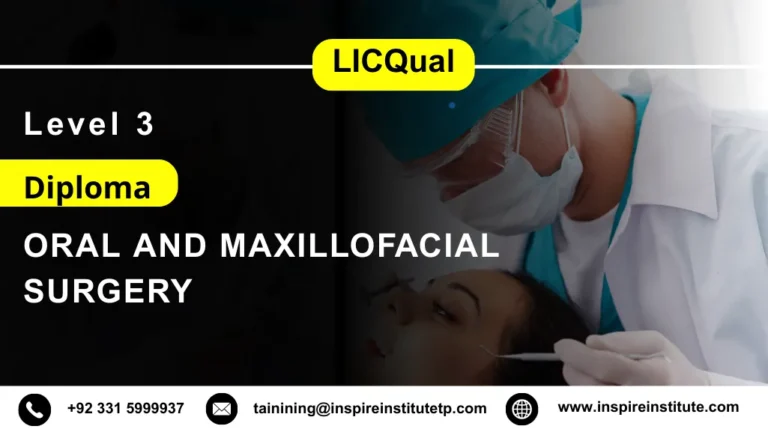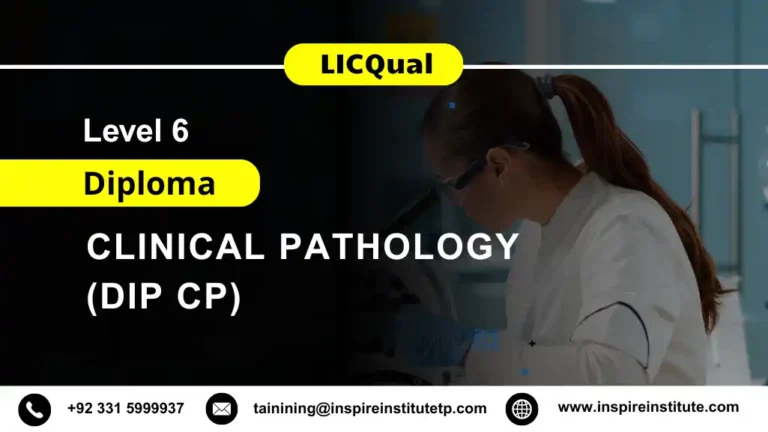LICQual Level 6 Diploma in Palliative Medicine (Dip PM)
The LICQual Level 6 Diploma in Palliative Medicine (Dip PM) is a prestigious and comprehensive qualification designed for healthcare professionals who aspire to specialise in the field of palliative care. As the demand for compassionate and holistic care continues to grow, this diploma equips learners with the advanced knowledge and clinical expertise required to enhance the quality of life for patients with life-limiting conditions. It focuses on building a deep understanding of the emotional, physical and psychological aspects of care, preparing professionals to provide meaningful support to patients and their families during the most sensitive stages of life.
The Level 6 Diploma in Palliative Medicine offers an extensive overview of modern palliative care practices and principles. The course content encompasses critical areas such as pain and symptom management, ethical decision-making, and holistic approaches to patient care. Learners are trained to deliver person-centred interventions that uphold patients’ dignity, autonomy and comfort. This qualification ensures that participants are not only competent in clinical techniques but also empathetic communicators who understand the human aspects of palliative medicine.
Throughout the programme, learners gain a robust set of skills and knowledge essential for professional excellence in palliative care. They learn effective communication strategies for engaging with patients and families, develop proficiency in managing complex symptoms, and explore the spiritual and psychosocial dimensions of care. The Dip PM also enhances learners’ ability to work collaboratively within multidisciplinary teams, ensuring the delivery of seamless and compassionate healthcare services.
The diploma places significant emphasis on practical applications, bridging theory with real-world practice. Participants are encouraged to engage in case studies, clinical placements and reflective practice to apply their theoretical learning in authentic healthcare environments. This experiential approach strengthens critical thinking, clinical judgement and leadership skills, empowering graduates to make informed decisions that improve patient outcomes in diverse care settings.
This qualification is particularly suitable for doctors, nurses and allied health professionals who are committed to advancing their careers in palliative medicine. By earning the LICQual Level 6 Diploma in Palliative Medicine, graduates demonstrate their dedication to delivering high standards of care, their readiness to assume senior clinical roles, and their ability to contribute to healthcare education and policy development. The diploma not only enhances career progression but also fosters personal and professional growth in a deeply meaningful field of medicine.
Why Choose this Qualification
The LICQual Level 6 Diploma in Palliative Medicine (Dip PM) is a highly respected qualification designed to advance the professional expertise of healthcare practitioners in the field of palliative and end-of-life care. This programme provides an in-depth understanding of the complex medical, ethical, and emotional aspects of supporting patients with life-limiting illnesses. It enables learners to deliver compassionate, evidence-based care while enhancing their leadership and communication skills within multidisciplinary healthcare environments. Choosing this qualification is a valuable step for professionals who aim to contribute meaningfully to the field of palliative medicine, improve patient outcomes, and strengthen their clinical career pathways.
Key Reasons to Choose this Qualification
1. Comprehensive Knowledge of Palliative Medicine
- Gain an advanced understanding of pain and symptom management grounded in clinical evidence.
- Learn the principles of holistic and patient-centred care for individuals with life-limiting conditions.
- Explore the biological, psychological, social, and spiritual dimensions of illness and care.
- Understand the global standards and guidelines governing modern palliative medicine.
- Develop the ability to evaluate and apply research to improve care quality and patient well-being.
2. Development of Critical Clinical Skills
- Enhance diagnostic and assessment capabilities for managing complex symptoms.
- Build confidence in prescribing and administering palliative interventions safely and effectively.
- Gain proficiency in interdisciplinary collaboration and integrated care planning.
- Apply clinical reasoning to address ethical and end-of-life care challenges.
- Strengthen decision-making through evidence-based approaches and reflective practice.
3. Ethical and Compassionate Communication
- Master advanced communication skills for engaging with patients and their families.
- Learn to navigate sensitive discussions around prognosis, treatment options, and end-of-life preferences.
- Cultivate empathy, emotional intelligence, and cultural sensitivity in patient interactions.
- Develop strategies to manage conflict and provide emotional support in care settings.
- Promote dignity, respect, and trust in every aspect of patient communication.
4. Practical Learning and Real-World Application
- Engage in applied learning through case studies, simulations, and practical assessments.
- Participate in supervised clinical placements to gain hands-on experience.
- Learn to integrate theoretical knowledge into practical care settings effectively.
- Build clinical leadership skills through situational analysis and reflective exercises.
- Translate academic learning into professional competence and real patient care outcomes.
5. Leadership and Professional Advancement
- Develop leadership qualities for managing multidisciplinary teams in healthcare.
- Gain the skills required to design, implement, and evaluate palliative care programmes.
- Strengthen competencies for policy development and quality improvement initiatives.
- Prepare for senior-level roles in clinical governance, education, or healthcare administration.
- Enhance professional credibility through a globally recognised palliative medicine diploma.
6. Research and Evidence-Based Practice
- Learn to critically analyse and interpret current research in palliative medicine.
- Apply research methods to enhance clinical practice and patient outcomes.
- Conduct independent research projects relevant to palliative and end-of-life care.
- Evaluate innovations in palliative medicine through a scientific and ethical lens.
- Contribute to advancing global best practices in palliative healthcare delivery.
7. Global Recognition and Accreditation
- Earn a qualification accredited by LICQual, a trusted UK awarding body.
- Gain international recognition, enabling professional mobility across healthcare systems.
- Align with UK and global standards in palliative medicine education.
- Benefit from an academic framework respected by employers and institutions worldwide.
- Join a growing network of healthcare professionals dedicated to palliative care excellence.
8. Career Growth and Lifelong Impact
- Enhance employability in both public and private healthcare sectors.
- Access opportunities for teaching, research, and consultancy roles in palliative medicine.
- Contribute to shaping compassionate healthcare policies and programmes.
- Empower yourself to make a measurable difference in patients’ lives through skilled, ethical care.
- Build a rewarding career path that aligns with your passion for human dignity and clinical service.
The LICQual Level 6 Diploma in Palliative Medicine (Dip PM) is more than an academic qualification—it is a professional commitment to excellence, compassion, and leadership in healthcare. By completing this programme, learners gain the expertise, confidence, and credentials needed to excel in palliative medicine and make a lasting impact on patients, families, and healthcare systems worldwide. This qualification sets a high benchmark for professional growth while strengthening the global standard of care for those facing life’s most challenging moments.
Course Overview
LICQual UK Awarding Body
Average Completion Time:
6-24 Months
Study Units: 6 Units
Evidence & Assignment Based
Mandatory Units
Who Should Take This Course
The LICQual Level 6 Diploma in Palliative Medicine (Dip PM) is designed for healthcare professionals who are passionate about improving the quality of life for patients with life-limiting illnesses. This advanced qualification provides a deep understanding of palliative care principles, ethical decision-making, and patient-centred practice. It is ideal for those who wish to enhance their expertise in managing complex clinical cases, delivering compassionate care, and leading palliative care initiatives within their organisations. The programme not only strengthens clinical proficiency but also fosters emotional intelligence, leadership, and evidence-based practice essential for excellence in palliative medicine.
This course is suitable for
1. Medical Practitioners and Physicians
- Doctors who wish to specialise in palliative medicine and expand their clinical scope.
- General practitioners managing patients with chronic or terminal illnesses.
- Hospital consultants involved in oncology, geriatrics, or internal medicine.
- Clinicians aiming to improve symptom control, pain management, and end-of-life decision-making.
- Medical professionals seeking formal recognition through a UK-accredited qualification.
2. Registered Nurses and Clinical Nurse Specialists
- Nurses providing bedside care for terminally ill or chronically ill patients.
- Palliative care nurses aiming to develop leadership roles in healthcare settings.
- Professionals seeking to enhance their communication and psychosocial support skills.
- Nurses involved in hospice, home-based, or long-term care environments.
- Practitioners wishing to integrate evidence-based palliative care into their daily nursing practice.
3. Allied Health Professionals
- Physiotherapists, occupational therapists, and dietitians involved in patient rehabilitation and comfort care.
- Social workers supporting patients and families through end-of-life transitions.
- Psychologists and counsellors focusing on emotional, mental, and spiritual well-being.
- Pharmacists managing palliative prescriptions and drug interactions.
- Professionals aiming to collaborate effectively in multidisciplinary healthcare teams.
4. Healthcare Managers and Administrators
- Leaders responsible for developing and overseeing palliative care programmes.
- Managers seeking to implement ethical, efficient, and compassionate healthcare policies.
- Administrators aiming to improve patient outcomes through quality assurance and clinical governance.
- Coordinators working on healthcare reforms or institutional capacity building in palliative services.
- Professionals wishing to align organisational goals with modern palliative care standards.
5. Hospice and Community Care Providers
- Individuals engaged in hospice management or community-based healthcare initiatives.
- Professionals supporting families and carers through bereavement and emotional counselling.
- Practitioners promoting holistic and home-based care models for end-of-life patients.
- Volunteers or coordinators involved in non-profit palliative care organisations.
- Care providers committed to integrating ethical, compassionate approaches into community practice.
6. Medical Educators and Researchers
- Academics teaching healthcare, nursing, or medical ethics with a focus on palliative care.
- Researchers studying pain management, ageing, and chronic illness care models.
- Trainers aiming to develop educational materials for palliative care capacity building.
- Professionals interested in conducting studies that advance clinical and ethical standards.
- Educators promoting awareness and professional development in palliative medicine.
7. International Healthcare Professionals
- Practitioners from global healthcare systems seeking a UK-accredited qualification.
- Medical professionals aiming to align their practice with international standards in palliative care.
- Healthcare workers from developing regions looking to implement structured care frameworks.
- Professionals planning to work in cross-cultural or global humanitarian medical programmes.
- Candidates interested in enhancing their global career mobility and recognition.
8. Career Changers and Healthcare Innovators
- Professionals transitioning into the healthcare sector with an interest in palliative care.
- Individuals motivated by the desire to make a meaningful impact in patients’ lives.
- Innovators aiming to introduce new models of compassionate and patient-focused healthcare.
- Policy advocates working towards improving public health systems through palliative integration.
- Entrepreneurs establishing healthcare facilities or NGOs focusing on terminal illness support.
The LICQual Level 6 Diploma in Palliative Medicine (Dip PM) is ideally suited for a diverse range of healthcare professionals and individuals dedicated to improving patient care and comfort. Whether you are a clinician, nurse, therapist, or healthcare leader, this qualification provides the essential knowledge, clinical skills, and leadership capabilities to excel in palliative medicine. It empowers learners to combine empathy with professional competence, ensuring that every patient receives dignified and compassionate care. Through this internationally recognised diploma, professionals can elevate their careers while making a lasting difference in the lives of those they serve. on both national and global levels.
Course Benefits
The LICQual Level 6 Diploma in Palliative Medicine (Dip PM) is a UK-accredited qualification designed for healthcare professionals, clinicians, and aspiring care leaders who wish to specialise in compassionate and evidence-based palliative care. This advanced, assignment-based Diploma in Palliative Medicine integrates theoretical learning with clinical practice, equipping learners to deliver exceptional end-of-life care, manage complex symptoms, and provide emotional and psychological support to patients and their families. Through a flexible and research-informed approach, this qualification prepares professionals to enhance the quality of life for patients with life-limiting conditions and to lead with excellence in multidisciplinary healthcare environments.
Key Benefits of the Course
Specialist Knowledge
- Gain a comprehensive understanding of pain and symptom management grounded in modern clinical principles.
- Develop expertise in ethical decision-making and holistic patient-centred care approaches.
- Explore key areas such as psychosocial support and communication in end-of-life care.
- Understand the integration of medical, emotional, and spiritual dimensions in palliative treatment.
- Study international standards and best practices that define quality palliative medicine.
Practical Application
- Apply theoretical knowledge in clinical settings through case studies and real-world simulations.
- Build advanced practical skills in pain management and symptom control.
- Strengthen ethical reasoning and problem-solving in complex palliative care scenarios.
- Enhance teamwork, leadership, and collaboration across multidisciplinary healthcare teams.
- Gain practical exposure to integrated care models for improved patient outcomes.
Recognised Qualification
- Earn a prestigious UK-accredited diploma recognised across global healthcare systems.
- Validate your clinical competence and professional expertise in palliative medicine.
- Strengthen your career prospects in healthcare management, consultancy, and education.
- Gain international recognition aligned with professional healthcare standards.
- Demonstrate a high level of clinical credibility and evidence-based practice competence.
Flexible Learning Pathway
- Study through an assignment-based system designed for working healthcare professionals.
- Progress at your own pace with flexible scheduling and accessible online learning resources.
- Receive personalised guidance from experienced mentors and academic tutors.
- Maintain balance between professional duties and academic advancement.
- Access structured digital materials that support independent and self-directed learning.
Evidence-Based Training
- Learn to interpret and apply the latest research and clinical guidelines in palliative care.
- Develop the ability to critically assess and implement evidence-based interventions.
- Understand and apply ethical frameworks in medical decision-making and patient care.
- Engage with real-world case studies to enhance analytical and clinical judgement.
- Improve patient outcomes through scientifically validated palliative practices.
Career Development
- Access diverse career opportunities across hospitals, hospices, and research institutions.
- Pursue advanced roles such as Palliative Care Specialist, Pain Management Consultant, or Clinical Coordinator.
- Strengthen qualifications for leadership or educational positions within healthcare systems.
- Build a foundation for further postgraduate studies and clinical specialisation.
- Gain recognition that enhances employability both in the UK and internationally.
Enhanced Patient and Community Impact
- Deliver compassionate, ethical, and culturally sensitive care to patients and families.
- Address the emotional, psychological, and spiritual dimensions of terminal illness.
- Support families through end-of-life transitions and bereavement with empathy and professionalism.
- Implement community-based and hospital-integrated palliative care strategies.
- Promote equitable and patient-focused care across diverse cultural settings.
Professional Growth
- Emerge as a skilled, compassionate, and globally competent palliative care professional.
- Strengthen leadership, communication, and reflective practice skills essential for clinical excellence.
- Cultivate empathy, emotional intelligence, and resilience in professional care settings.
- Enhance collaboration and coordination within multidisciplinary healthcare environments.
- Build confidence in decision-making and patient advocacy.
The LICQual Level 6 Diploma in Palliative Medicine (Dip PM) empowers healthcare professionals to become leaders in end-of-life care through advanced knowledge, practical expertise, and internationally recognised credentials. This qualification not only enhances career opportunities but also contributes to elevating global standards in palliative care, ensuring that patients receive comfort, dignity, and support during life’s most critical moments.
Eligibility Criteria
The LICQual Level 6 Diploma in Palliative Medicine (Dip PM) is a UK-accredited qualification designed for healthcare professionals and clinicians who wish to enhance their knowledge, clinical expertise, and compassionate approach to end-of-life care. This assignment-based programme combines theory with real-world practice, preparing learners to plan, implement, and evaluate holistic palliative care strategies that uphold patient dignity and well-being.
Educational Background:
Applicants should hold a recognised qualification in medicine, nursing, healthcare, or a related clinical discipline. A Level 5 diploma or equivalent qualification in healthcare management or medical sciences is also acceptable. Those with international qualifications will be evaluated individually to ensure alignment with UK academic standards.
Professional Experience:
A minimum of one year of relevant professional experience in healthcare, hospice, or palliative care is recommended. Previous involvement in patient counselling, end-of-life support, or pain management is advantageous. However, applicants with strong motivation and interest in palliative medicine are also encouraged to apply.
Age Requirement:
Applicants must be at least 18 years old at the time of enrolment. This ensures maturity, ethical awareness, and professional responsibility essential for handling the sensitive and compassionate nature of palliative care practice.
Language Proficiency:
As the course is delivered in English, applicants must demonstrate proficiency in reading, writing, and communication. Non-native English speakers are advised to have an IELTS score of 6.0 or an equivalent qualification to effectively engage in assignments and discussions.
Technical Requirements:
Learners should have access to a computer or laptop with a reliable internet connection to participate in online learning. Basic computer literacy, including research, document preparation, and digital communication, is required for successful course completion.
Required Documents:
Applicants must submit a valid ID or passport, academic transcripts or certificates, proof of professional experience (if applicable), and evidence of English language proficiency for non-native speakers.
The LICQual Level 6 Diploma in Palliative Medicine (Dip PM) ensures that learners from diverse healthcare backgrounds are fully equipped to provide high-quality, ethical, and compassionate care to patients and families, advancing global standards in palliative and end-of-life care.
The Qualification Process
LICQual Level 6 Diploma in Palliative Medicine (Dip PM) follows a structured pathway to ensure learners gain comprehensive knowledge, practical skills, and professional competence in community oral healthcare.
Step 1: Self-Assessment
Learners review the entry requirements to confirm eligibility. Candidates with a background in dentistry, oral health, or public health are encouraged to apply.
Step 2: Registration
Complete the registration process by submitting required documents such as proof of qualifications, a valid ID, and payment of enrollment fees.
Step 3: Induction
An induction session is conducted to:
- Verify learner eligibility and documentation.
- Introduce study materials, learning outcomes, and assessment procedures.
Step 4: Learning and Evidence Submission
Learners complete assignments, case studies, and practical exercises demonstrating competence in public health dentistry, community oral health assessment, preventive strategies, and program planning.
Step 5: Feedback and Revision
Assessors review submitted evidence and provide constructive feedback. Learners can revise and resubmit work to meet all required standards.
Step 6: Competence Validation
Final submissions are evaluated to confirm that learners have met all theoretical and practical learning outcomes.
Step 7: Internal Quality Assurance (IQA)
The IQA team reviews the assessment process to ensure accuracy, fairness, and compliance with international standards.
Step 8: External Verification (EQA)
External verifiers validate the authenticity and quality of learner achievements.
Step 9: Certification
Upon successful verification, learners are awarded LICQual Level 6 Diploma in Palliative Medicine (Dip PM), demonstrating advanced proficiency in community oral healthcare and preparing them for professional growth in dental public health, preventive dentistry, and healthcare policy.

